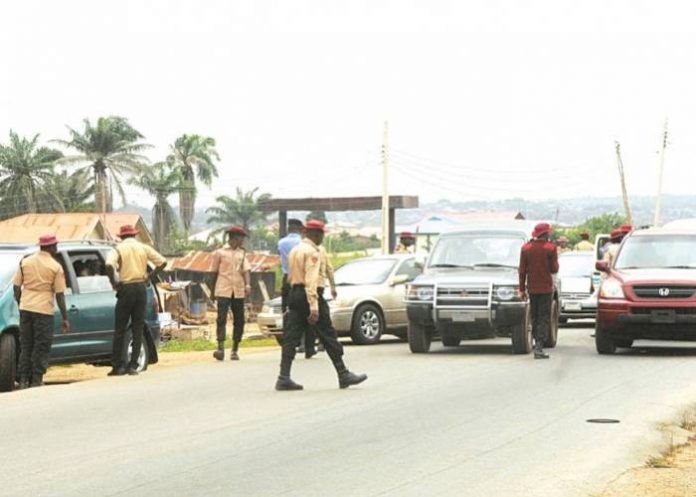
From dealing with daily traffic snarls and potholes to unruly drivers in rickety vehicles with expired documents, Nigeria’s highway patrol officers have a lot on their plate.
At the same time, they have to face the risks from armed robbers who attack unsuspecting road users idling in monster traffic jams.
But an increase in crime on the roads has sparked fresh debate over whether members of the Federal Road Safety Corps should be allowed to carry firearms.
The chief marshal of the FRSC, Boboye Oyeyemi, has said some 70 operatives were either shot dead by robbers or knocked down by hit-and-run drivers in 2016.
Those deaths would have been prevented if his operatives had guns, he claimed.
FRSC spokesman Bisi Kazeem said officials were legally entitled to do so.
“The provision is there in the FRSC Act but the government has to approve and gazette it before it can be implemented,” he told AFP.
Nevertheless, industry sources said an armoury had been built for the agency in the capital, Abuja, should the green light be given.
Last year, the lower chamber of parliament, House of Representatives passed a resolution urging the government to procure weapons for the road marshals.
– Guns are symbol of power –
Nigeria, Africa’s most populous country of more than 180 million people, returned to civilian rule in 1999 after decades of military rule.
Politicians having replaced generals are in charge of the country. But uniforms are still everywhere — and many of those who wear them are armed.
They include the army, navy and airforce, the police, customs, immigration and prison service, officers from the anti-drug agency and the civil defence corps.
Some believe adding to the list is a recipe for disaster — particularly for anyone dealing with Nigeria’s hot-headed and frequently frustrated motorists under the tropical sun.
Opponents believe it will further militarise the country and aggravate tensions, as security forces deal with threats from Boko Haram jihadists or violence between herders and farmers.
The gun is seen as the ultimate symbol of power in Nigeria and there have been well-documented cases of human rights abuses, including torture and extra-judicial killings.
Recently, a police special anti-robbery squad was forced to change its name following public outrage at atrocities by its officers against civilians.
“Allowing the FRSC to bear arms is tantamount to militarising the polity and unnecessary proliferation of arms,” said Don Okereke, a security consultant.
“There are too many outfits carrying arms in the country such that people continue to live under constant fear. This is not healthy for the civil society.”
Okereke said there would be more killing of innocent people in what the police claimed was due to “accidental discharge” if the FRSC is armed.
A retired FRSC commander, who asked not to be identified, agreed.
“The timing is wrong. Now that elections are approaching we should not encourage anything that can heat up the polity,” he added.
Unscrupulous politicians could pay corrupt FRSC operatives to use their guns against their opponents, he added.
Nigerians go to the polls on February 16 next year to elect a new president and parliament, with state governorship and local assembly polls held two weeks later.
– ‘Power-drunk’ –
On the roads of Lagos, Nigeria’s biggest city where traffic is a constant headache and tempers flare, drivers already have a lot to deal with.
They include over-zealous traffic police with sticks and spike strips to burst tyres, officers from the FRSC and its local equivalent the Lagos State Traffic Management.
Add in the so-called “area boys” or gangs who run the bus stops and depots for the battered yellow minibuses or danfos, driving often resembles a city-wide shakedown for cash.
“Without weapons, the FRSC is already a fearsome unit,” said Olufemi Oluwaseye, a communications student who is a regular user of public transport.
“They (the FRSC) have this unique way of instilling discipline, even if temporary, into even the harshest drivers,” he said.
The argument that they need arms to defend themselves does not fly, he said.
“We know the argument from government would be that the privilege won’t be abused or that the lives of the FRSC officers on duty are always at risk without weapons,” he said.
“But the issue is that we would only be creating more power-drunk officers and civilians, unfortunately, would be at the receiving end.”



Comment here